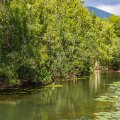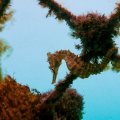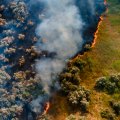The University of Queensland has renewed its focus on sustainability and conservation in order to develop a new generation of environmental experts.
UQ has consolidated its environmental management expertise within the School of Geography, Planning and Environmental Management.
Experts from a diverse range of fields including coastal ecology; conservation and natural resources management; climatology; environmental law and policy; environmental management in industry; environmental impact assessment; planning and GIS will now teach into the Environmental Management program, making it one of the most comprehensive of its kind.
Professor Marc Hockings, Vice Chair for the IUCN World Commission on Protected Areas and leader of its global program on Science and Management has been appointed the Environmental Management Program Director.
"Bringing together the University's experts into one organisation has enabled us to create a program that is focused on tackling current environmental issues and how to convert this into effective policy both locally and internationally," Professor Hockings said.
Head of the School of Geography, Planning and Environmental Management, Professor Shulmeister said, "Managing the environment effectively is critical to sustaining future human populations and is a key focus for our School."
After extensive consultation with industry and students, UQ's Master and Bachelor programs in Environmental Management have seen exciting innovations that will allow students to personalise their study experience.
Bachelor of Environmental Management students can undertake their program either in the field of Sustainable Development or in Natural Systems and Wildlife Management. Within these fields, students can select one of seven areas of specialisation that enable them to develop skills in:
> Environmental Monitoring and Assessment
> Business & Sustainability
> Global Change
> Regional Natural Resource Management
> Marine and Coastal Management
> Conservation & Wildlife Management
> Parks and Wildlife Management
"As well as these specialisations our Bachelors program provides students with high level professional skills and strong practical experience. This is achieved through extensive field trips, one semester of industry placement and a one year in-depth project with real world applications working with an industry partner," Professor Hockings said.
The postgraduate program has also seen changes with four fields developed to allow students more flexibility in their course choices. Students can choose from sustainable development; conservation and natural resource management; conservation biology; and resource and environmental economics.
"The postgraduate program is characterised by the way in which it integrates information from multiple disciplines to address environmental issues."
By bringing together its experts in this field into one School, UQ has strengthened its position as one of the leaders in environmental education.
"UQ has a reputation for producing outstanding graduates in this field. These changes will enhance already excellent outcomes for students and employers," Professor Shulmeister said.
Media: k.swanson@uq.edu.au or 3346 7406
.jpg)












